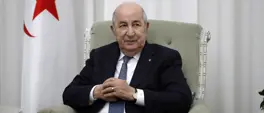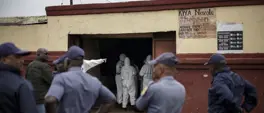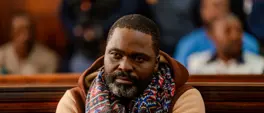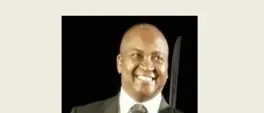As he readies to hang up his robes, Zondo says it was 'an honour and a privilege' to be Chief Justice
Bernadette Wicks
27 August 2024 | 9:41Outgoing Chief Justice Raymond Zondo sat down for a wide-ranging interview with Eyewitness News, during which he shared how he first learned of his appointment.
JOHANNESBURG - Outgoing Chief Justice Raymond Zondo says it was "an honour and a privilege" to be appointed to the highest judicial office in the country, a position from which he became a defender of democracy, and a scythe against the capture of the state.
Zondo took office on 1 April 2022, succeeding former Chief Justice Mogoeong Mogoeng.
Now, a little more than two years later, Zondo, too, is preparing to hang up his robes.
Against this backdrop, he sat down for a wide-ranging interview with Eyewitness News, during which he shared how he first learned of his appointment.
ALSO READ:
• Chairing state capture commission strengthened resolve to fight corruption, says Zondo
• Zondo on State capture prosecutions: 'The pace is not satisfactory'
• Zondo to spend 1 year travelling before empowering young legal minds
• 'It's a bad idea': Zondo warns against returning SA to parliamentary sovereignty
• Zondo: There was no other option but to hold Zuma in contempt for defiance of ConCourt order
Despite having been Mogoeng’s second-in-command and acting in his place after his retirement, Zondo was not a shoo-in.
He was up against three other candidates and had an at-times heated interview before the Judicial Service Commission, at the end of which he was not its top pick.
It was then several weeks before President Cyril Ramaphosa, who has the final say on the matter, announced Zondo’s appointment.
He was in a virtual hearing when he received a message that the president wanted to meet with him and the necessary arrangements were made as soon as he had wrapped up.
While he had not been told beforehand what the tete-a-tete was about, he had a feeling,
"On the way, something said to me: 'Maybe it is about this'. And of course, the question was whether I was called because I was going to be appointed or I was called because I was the acting chief justice and if somebody else was appointed, it was courtesy that I be told before it went public."
It was, as we now know, the former.
Zondo describes Ramaphosa’s decision as a "bold" one, "because I didn't think that it would have been an easy decision to make. But I was happy that he showed confidence in me and that I would be given a chance to serve in that capacity and finish at that level. So, it was quite an honour and a privilege," he says.
As a young man, Zondo considered becoming a teacher or a priest. And, patient and humble, it’s easy to imagine him as either - it’s 4 o’clock on a Friday afternoon when he sits down with us for his umpteenth interview of the day but we are received with an earnest enthusiasm, a broad smile and a warm handshake. In the end, though, it was law that stole his heart when he was in what was then known as form 2 (grade 9 today).
"One of the subjects I did at school was history and in studying history, one got exposed to struggles," he says.
"I was very much engaged in the struggles of the people who were oppressed in different parts of the world and how they struggled to attain freedom and I found out that in a number of those struggles, lawyers seemed to play a very important role - either they were leaders of those struggles or somehow they were playing a very important role. And I looked at our own country and the struggle for freedom in our own country and I thought, well, taking law might be good because then one can make a contribution through law."
Zondo came from a poor family, something he has spoken about many times before - including at his interview before the Judicial Service Commission for the position of Deputy Chief Justice in 2017. He became emotional as he told the story of how Solly Bux - a local storekeeper in his hometown of Ixopo, in the rural KwaZulu-Natal Midlands - gave him vouchers for his family to buy groceries while he was studying and further how when he went to repay him years later, Bux asked him only to pay it forward.
Zondo was, however, driven to change his circumstances and saw education as his way out - a view he shared with his mother.
"My mother was very passionate about education and she wanted all her children to get a good education and she made lots of sacrifices but she drummed it into our heads how important education was. So that was the only thing that one identified, namely education, that could help take one out of poverty. And of course, that's what it did," he said.
Zondo served part of his articles of clerkship under anti-apartheid lawyer Victoria Mxenge, who - before she was ultimately assassinated in 1985 - put him in charge of her firm’s labour department. And it was in this area of the law, labour, that Zondo made his name as a lawyer.
"I think it was natural that when you had the kind of background that I had - you would want to do labour law because you would be helping people, some of whom are in the kind of situation that you are coming from," he said.
He hastens to add, though, that "there are a lot of other labour lawyers who didn't have similar backgrounds" but went on to become experts in the field.
Zondo prides himself on the difference he was able to make in people’s lives as a lawyer.
"Actually, recently, somebody, I think my wife, was reminding me of a group of workers whose case I'd done and they had been reinstated, who bought me a sheep to slaughter and enjoy with the family. That's how grateful they were," he said.
"Some cases, one was happy because of the law that they made. Other cases, it might not have been so much the law, but the impact, the practical effect on the people involved… There are a number of cases that I believe made a big difference in the lives of people."
As a judge, too, it’s clear that helping people has always been front of mind for him.
The thought of joining the bench, let alone becoming the Chief Justice, never crossed Zondo’s mind until 1996.
"When I was at university, of course, before 1994, one could not have thought about being a judge in apartheid South Africa."
He was first appointed as a Judge of the Labour Court in 1997, though, and asked about the cases he’s most proud of working on in that capacity, points to Ndima v Waverley Blankets Limited, which ultimately saw the Insolvency Act amended so that when a company goes into provisional liquidation, workers’ contracts are suspended as opposed to being terminated, as was the position previously.
"What would happen is that the contracts would be terminated and later on the company might survive but then they were gone and other people might be appointed. Whereas if you suspend the contracts of employment pending the outcome, then if the company survives they are still in employ," he said.
"So I think that helped a lot of people."
And as he prepares to bow out, it is this about the law, its potential to uplift the vulnerable, that he hones in on when asked for his advice to young lawyers.
"You can use law to change conditions under which people live. You can use law to change conditions under which people work. It can be very satisfying," he said.
Get the whole picture 💡
Take a look at the topic timeline for all related articles.















